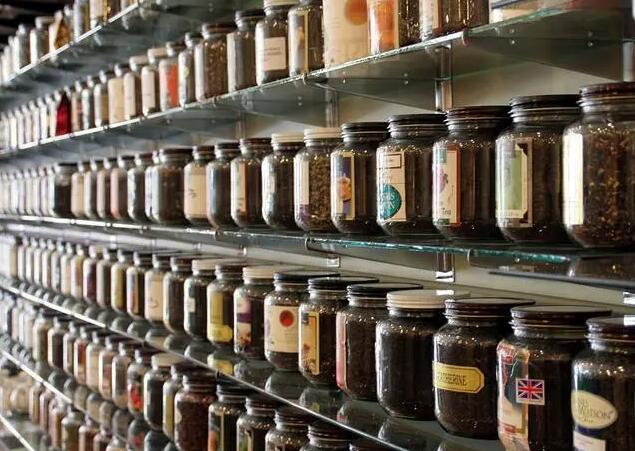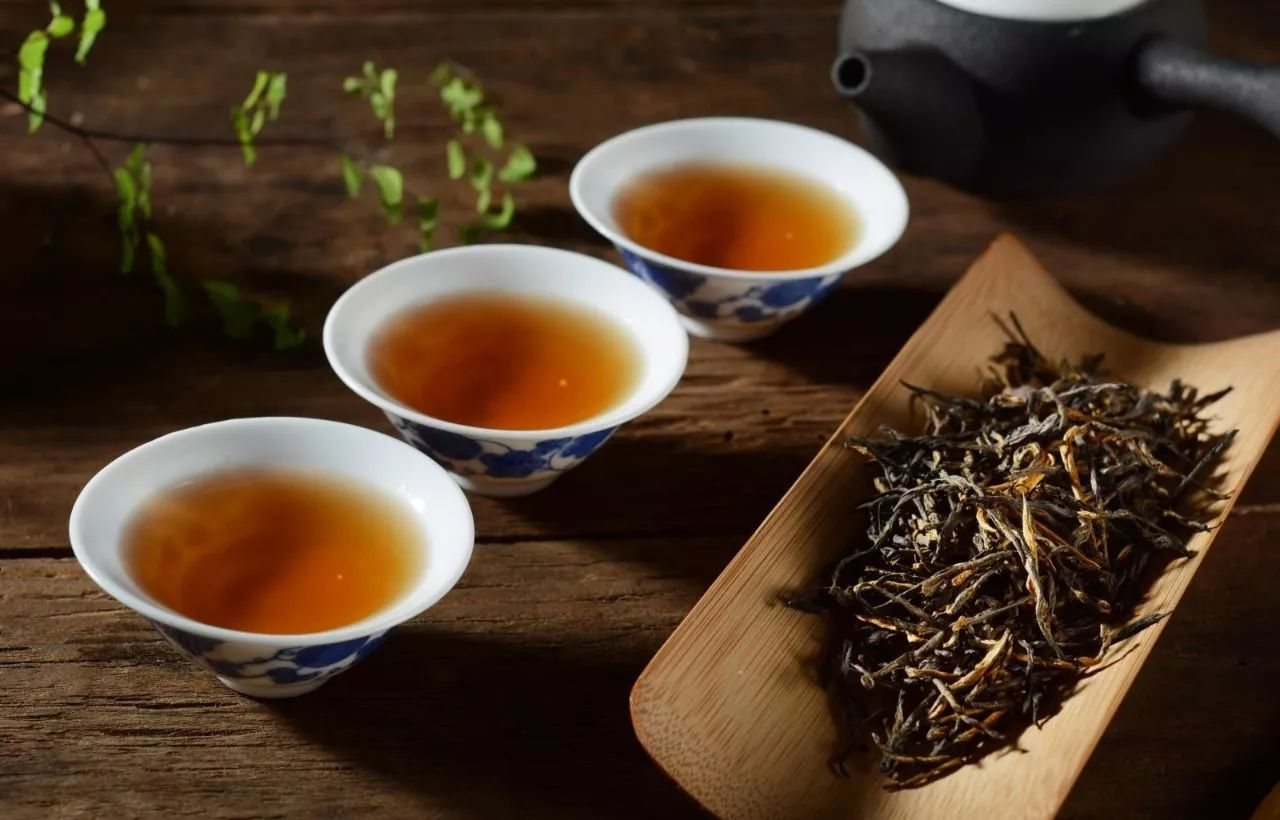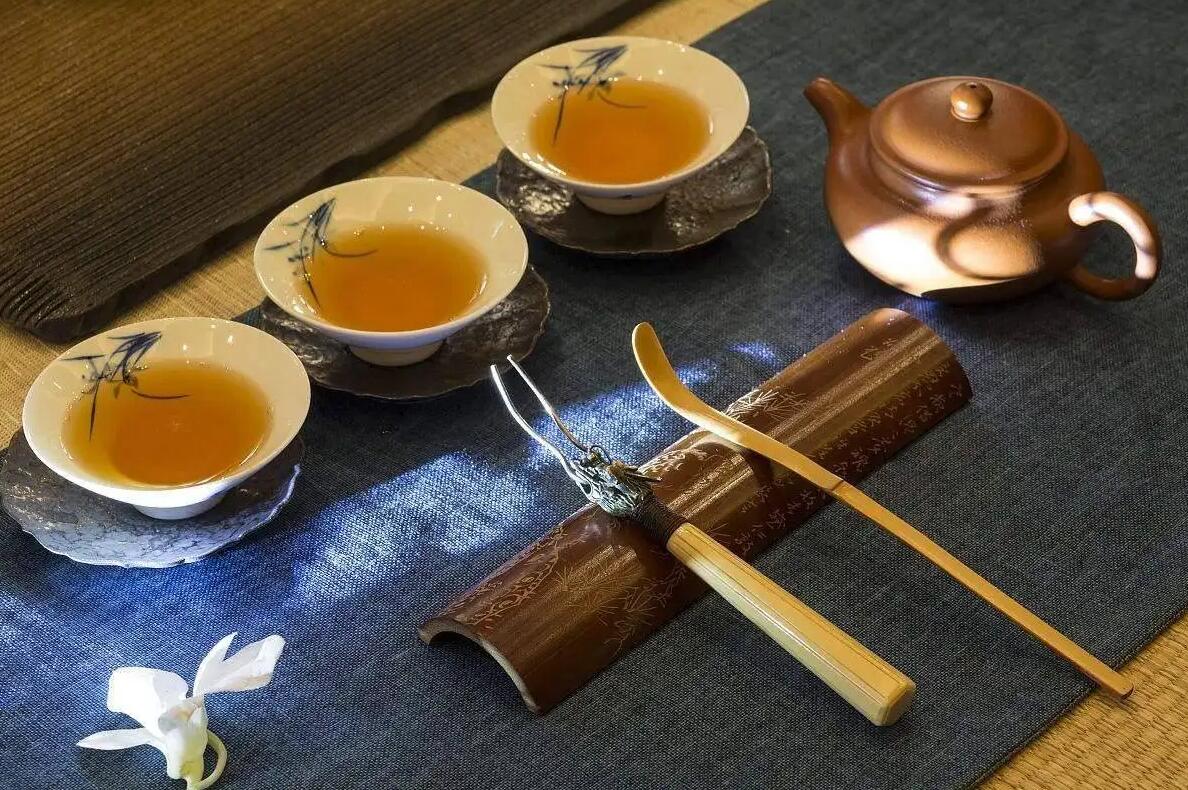Inscribed on the panels of a corridor in the main hall of Lao She Teahouse are the names of celebrities who have visited the teahouse since its founding in 1988. In 18 years Lao She Teahouse has received more than 50 foreign state leaders. Why is the teahouse so attractive?
Lao She Teahouse is named after famous writer Lao She. Its main hall is decorated in a simple, unsophisticated yet graceful style. Every night various kinds of folk vocal art, Chinese opera and magic are performed in this hall. Customers can get up the stage and give a show too. This Chinese-style salon often hosts such events as music playing, chess games and demonstration of calligraphy and painting. Besides tea the teahouse also serves refreshments once exclusively for the imperial court and Beijing snacks. Lao She Teahouse has become a tourist destination. It is like a showcase of Beijing folklore.
Lao She Teahouse is specially liked by overseas visitors because they can learn about Chinese culture, and particularly, the culture of Beijing there. The teahouse receives 60,000 to 70,000 overseas visitors from more than 100 countries every year. Among its distinguished guests are former American President George Bush, former American State Secretary Henry Kissinger,former UN Secretary-General Kurt Waldheim, former Russian Prime Minster Primakev, former Japanese Prime Ministers Kaibu Toshiki and Shiro Nakano, former Singaporean Prime Minster Lee Kuan Yew and Thai Princess Sirindhom. After Kissinger^ visit other VIPs began to come to Lao She Teahouse. They were interested in everything in the teahouse. As Kissinger had done they also asked for a gold ingot as a keepsake and had a photo taken with Chinese Many foreign visitors have spoken highly of Lao She Teahouse. A Uruguayan vice president made a comment that reads: "The Arabian Nights-like evening party has left a deep impression on my." A Slovakian parliament vice president said he was intoxicated by the Chinese art and marvelous tea.
The founder of the Lao She Teahouse is Yin Shengxi, the late General Manage of Beijing Big Bowl Tea Commerce and Trade Group Corporation. In 1988 China had just adopted the policy of reform and opening to the outside world Western culture began to pour in to challenge the Chinese traditional culture. National art forms such as native operas declined rapidly. Yin Shengxi, who loved Chinese traditional culture, decided to open a teahouse with strong Beijing folklore characteristics. He hoped to promote Chinese traditional culture by gathering traditional operas, Beijing snacks and Chinese tea culture in the teahouse.
Yin Shengxi was a legendary man. In the autumn of 1949, young Yin Shengxi helped his fattier make huge red lanterns that would hang on the tower of Tian'anmen Gate, from which Chairman Mao Zedong was going to announce the founding of the Peopled Republic of China. Premier Zhou Enlai came to inspect the lanterns and was satisfied. He shook hands with Yin Shengxi's father and thanked him for his wonderful craftsmanship. This scene was imprinted in Yin Shengxi's memory and stimulated his life-long love of Chinese Influenced by his father, Shengxi was quite accomplished in Peking Opera, calligraphy and painting. When Chinese traditional culture kept declining in the 1980s Yin Shengxi wrote on a couplet these words: "To rejuvenate the Chinese tea culture; To nurture the flower of national art. " Urged by his love of culture and a sense of historical mission, he opened the Lao She Teahouse.
The Lao She Teahouse provides an arena to display Chinese traditional culture and art. Yin Shengxi invited artists to perform in it. Among them are famous Peking Opera singer Mei Baojiu, master ballad singer Guan Xuezeng, veteran comedian Ma Sanli, famous actress Wei Xikui and famous folk entertainers Luo Yusheng and Sun Shujun.
Lao She Teahouse pays great attention to salvaging those forms of folk art on the brink of extinction. The retirement of comedian Sun Baocai, one of the "Eight Weirdies of Tianqiao" accelerated the decline of the two-man comic show. Yin Shengxi invited him to perform in his teahouse. This act of his made the show popular again. It was performed at a Spring Festival Evening Party staged by the China Central Television Station. Another form of folk vocal art, the "Lamp in Mouth Ballad", which is an adaptation of "Plum Blossom Ballad", has become a repertory of Lao She Teahouse.
Lao She Teahouse promotes not only Chinese traditional culture but also introduces foreign culture to Chinese customers. After Johann Strauss Symphony Orchestra played at the teahouse in 1995, more and more overseas art troupes come to perform there, attracted by its unique atmosphere. Lao She Teahouse has become a venue for international cultural exchange.
To recommend Lao She Teahouse's contribution to the cultural work, Beijing Tourism Administration has a special kind of tea leaves among its souvenirs distributed as gifts at its overseas promotion sessions. leaves uncurl in hot water like beautiful blossoms and tea fragrance emits. The wonderful tea reminds people of Chinese tea culture and the name of Lao She Teahouse.
The boss of Lao She Teahouse today is Yin Zhijun. She took it over when the teahouse was in a difficult time. In 2003 Lao She Teahouse was forced to close due to the rampant spread of SARS, Old Manager Yin Shengxi died shortly after the epidemic passed over. When Yin Zhijun came to work at the teahouse her father asked her to put on a yellow mandarin gown trimmed with black laces and handed over a notebook with the names of performers. Though her father did not say a word she knew she had to start from the very beginning. She overcame many difficulties and gradually learned the management skill. to start from the very beginning. She overcame many difficulties and gradually learned the management skill.
Yin Zhijun has turned the service of snacks in the teahouse as a kind of art. She demands every piece be made with an exquisite shape with low sugar content. The customers do not have to worry about taking in too much caloric when they have a piece too many. She also renovated some traditional forms of vocal art after she found out old overseas Chinese from Southeast Asia love them in their original taste while American and European guests and young Chinese are impatient with long narrations. Yin Zhihun began to try to break a long ballad singing into short sections and use music and dance accompaniment. Her action was opposed by performers as well as the teahouse employees, But her new form of performance was liked by the customers and the business volume rose by a big margin.
Yin Zhijun believes the key point for doing good business is good service, and the key point of providing good service is capable people. Yin Zhijun who had studied hotel management, was determined to strengthen the teahouse management with modem concepts. Despite of strong opposition she installed a punch-card machine in the teahouse and dismissed some lazy and unqualified employees,including some who had been with the teahouse from the very beginning. Her action shocked all and she was criticized or even called names. Yin Zhijun said with a broad mind: "They will understand me sooner or later. All the things I do are for the interests of the teahouse." Yin Zhijun also practices a system called "elimination of the last". At the end of every year she fires two or three employees who have performed badly and hires new ones in their place. Every season she sends some of her employees to take training courses of tea ceremony performance, English language and computer operation. All her employees must have certificates related to their jobs. She opened a tea courtyard with a classical air. Only in half a year, its business volume reached a record high of one pillion yuan. She promotes Lao She Teahouse by publishing books and pamphlets and through Internet.
Lao She Teahouse is filled with a strong atmosphere of Beijing foodcard. Waiters in long robes greet the customers warmly: "Welcome." "Upstairs please. It is more spacious there," "Please go to the third floor." Their manner reminds the customer of the etiquette particular to old Beijing residents.
The second floor is decked out like a traditional courtyard in Beijing. Two stone drums carved with lions are placed on either side of the entrance and above the entrance are red lanterns. Small stone lions crouch in front of the principal rooms whose eaves are Covered with gray tiles. Inside the principal rooms are long tables, wooden armchairs, antiques and vases, giving off a poised and stately air. Some of the quiet wing rooms have curtains reaching the floor and rattan chairs and some of them look like a waterside pavilion. Katydids chirp in the courtyard and the sound of an ancient lute lingers in the air. Customers feel much relaxed here over a cup of fragrant tea.
The third floor is divided into two parts. The eastern part is the Big Bowl Tea Restaurant. This place attracts the largest number of customers and is the part of Lao She Teahouse first opened to service. Here some stage scenes of the modem drama "Teahouse" are displayed. The western part is a 300-seat theater with the largest area of Lao She Teahouse. Under a spacious stage are old-style tables and armchairs. Peking Opera, clapper talk, crosstalk, acrobatics, magic, ancient-style song and dance performance and other Beijing native forms of entertainment are staged here every night.
The main purpose of people at a teahouse is, of course, to drink tea. Lao She Teahouse serves various kinds of tea. They purchase tea leaves directly from the production area and process the tea leaves with special techniques. Tea leaves spread in hot water like blooming flowers and give off a pleasant aroma blending the delicate fragrance of tea leaves and the thick fragrance of flowers. The tea has a unique taste and is good for health. Lao She Teahouse also prepares tea banquets. Among the best dishes are the "Spring Transportation in Rural Area" made up with "Spring Green Snails" tea leaves, scallops and asparagus, the "Guanyi Presenting Treasure" made up with abalone, chicken shreds and "Iron Guanyin" tea leaves,and the "Fried Bird's Tongue", with "Fluff Peaks of Huangshan Mountain" tea leaves as the main ingredient.
Lao She Teahouse has a business space of 3,300 square meters. The theater has 358 seats. The Big Bowl Tea Restaurant has a business space 500 square meters, able to are commodate 150 diners at the same time. The New Beijing Tone Tea and Food Hall on the first floor has added to its regular shows two new items: shadow puppet play and a new kind of folk music.
The performances of Peking Opera, folk vocal art, magic, face changing and kung fu are scheduled every night from 7:40 to 9:20. The ticket fare ranges from 60 yum to 180 yuan according to the distance to the stage.



